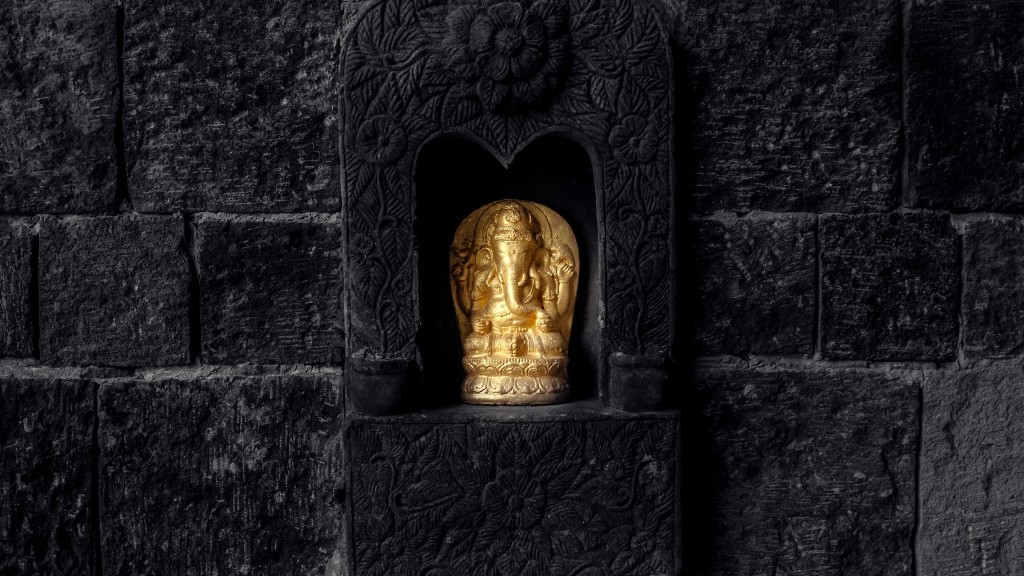Overview
Hinduism is one of the world’s oldest religions, and its followers have sought to answer the question ‘What is the purpose of life?’ for centuries. Hinduism has many interpretations and philosophies which each emphasize different aspects of life’s purpose. Generally, teachings focus on the importance of Dharma, or moral duty, good Karma, spiritual emancipation and, finally, non-attachment. Read on to gain insight into each of these principles and how they assist in understanding the purpose of life according to Hinduism.
Dharma
Dharma is an essential concept in Hinduism. Dharma is an individual’s duty to abide by the universal laws of the cosmos and to apply that knowledge in everyday life. It is important to act with kindness, justice, self-control and compassion. Following Dharma is essential for setting the foundation for a meaningful life. In order for individuals to reach Moksha, or enlightenment, it is necessary to live life congruently with the laws of Dharma, no matter the outcome.
Karma
Karma is linked closely to Dharma. It explains that the consequences of our actions, both good and bad, follow us throughout life. Furthermore, it explains that the outcome of our actions sets the foundation for our future. For example, an individual who is kind and honest with others sets the foundation to live a just life. Inversely, someone who lies or disrupts the peace of others will be bound to experience these consequences in the future.
Spiritual Emancipation
Spiritual emancipation is the ultimate goal of Hindu life, known as Moksha. It is achieved when Atman, the eternal self, reunites with Paramatman, the cosmic self. It seeks to dissolve the ego and all that comes with it, such as wants and desires, to unite with the supreme being. It is achieved through liberation from Samsara, the cycle of birth and death. To achieve Moksha, it is necessary to follow Dharma and to rid one-self from the karmic consequences of ones past.
Non-Attachment
Non-attachment is closely related to gaining emancipation. Non-attachment is a concept in which individuals remain detached from material comforts and sensory gratification, such as wealth or pleasure. This is important because it helps free oneself from the chains of karma. Non-attachment encourages individuals to view the circumstances of their lives as impermanent and suggests to remain at peace with them. It teaches to remove oneself from the realm of material comforts, enjoy their amenities while they last, and to be willing to release them at any time.
The Role Of Yoga
Yoga plays an important role in Hinduism as a vehicle for liberation. It focuses on using physical, spiritual and mental exercises to move towards Moksha. Yoga works on cultivating Ahimsa, non-violence, through ethical practices and meditation. Through meditation, individuals are able to gain insight into their true nature and realize Atman, the cosmic self. Through yoga, individuals can better connect with Dharmic principles and strive towards Moksha.
The Role Of Discipline
Discipline is essential in practicing the concepts of Dharma, Karma and Moksha. To live life according to Dharma, individuals must follow a moral code, some of which can be difficult, and this requires discipline. To make decisions based on Dharma requires a great deal of self-knowledge and self-discipline. Similarly, for individuals to reap the positive outcomes of their good Karma and make progress in their spiritual emancipation, it requires tremendous discipline and dedication.
Developing A Meaningful Life
Hinduism is a rich and profound religion which has those seeking to answer the question of ‘What is the purpose of life?’ The above-mentioned aspects act as nodes which, when combined, brings individuals closer to the answer. To developing a meaningful lives focus on Dharma, practice non-attachment, be mindful of your karma and use yoga and discipline to develop a spiritual practice. By making this components part of your life, it supports you in living a life rooted in purpose.
Where Does The Soul Go After Death?
In Hinduism, it is believed that the soul does not die with the body. The soul is immortal and can be reborn into a new body, in a process known as reincarnation. Where the soul goes after death is determined by the kind of life the person has led and the amount of good or bad karma they have accrued. A life that follows Dharma and practices good karma and non-attachment will lead to the soul being reborn in better circumstances. On the other hand, a life that disregards Dharma and practices selfishness and desires will lead to the soul being reborn in increasingly difficult and detrimental circumstances.
How Does Hinduism Support Mental Wellbeing?
Following the principles of Hinduism has many benefits, one of which is improved mental wellbeing. By living with an understanding of Dharma and Karma, and living life in pursuit of Moksha, individuals can rest assured in knowing that they are living a right and meaningful life. Furthermore, following Dharma can lead to a life free of stress as one is free from worrying about the negative outcomes of their actions. Additionally, the practice of Yoga and meditation helps to cultivate peace of mind and provides individuals with a greater access to one’s true nature.
How Does Hinduism Support Social Interactions?
The teachings of Hinduism are based on acting with love and compassion. To follow Dharma one must act with kindness, justice and self-control, and these principles can help bring about interactions rooted in benevolence and understanding. Non-attachment helps individuals remain dispassionate in the face of difficult situations, and helps to create an atmosphere of mutual respect between both sides. Furthermore, living a Dharma-sensitive life can help promote a sense of justice and understanding, which can help improve social interactions in the long run.
